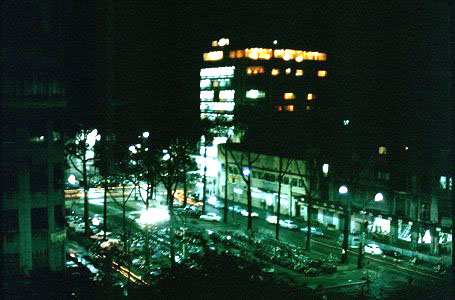

It was Saigon, March 1966 and time for dinner. My patrol squadron was flying out of Tan Son Nhut air base and billeted in hotels in Saigon. It was early evening with a warm breeze was replacing the heat of a hot afternoon sun. Five of us, all junior Navy officers in our twenties, were deciding where to eat.
“Let’s try the Caravelle. Crew Four ate there yesterday and said it was pretty good.”
“The roof-top terrace restaurant has a great view. Overlooks the Saigon River.
“Yes, they also have live entertainment. A Vietnamese band with a good looking singer.”
“Sounds good to me.”
Our opinions expressed, we all nodded our vote and it was unanimous: dinner at the Caravelle. It took twenty minutes to walk from our hotel to the Caravelle Hotel with the restaurant on top.
By time we were settled in at our table and ordered our first round of drinks, the sun was sinking. The sunset provided a golden tint not only to the city rooftops but also to the green countryside across the river.
The five of us talked about the usual stuff: the two married guys talked how they missed their wives and pre-school children and we all talked about flying. We talked about our flights off the coastline of South Vietnam. We talked about how lucky we were that we did not have to go north like so many of our friends that we went through flight training with before any of us knew exactly where Vietnam was. When our drinks came, warm beers and rum and cokes without ice, we talked about how great it would be to be back in the states, the land where electricity was plentiful – at least enough to keep beer cold and generate ice cubes to satisfy a thirsty nation.
The band on the small stage started playing American songs that were popular a decade or two before. It was apparent that the pretty young female vocalist did not speak English, but was singing the words she had learned phonetically. At the end of each attempt, we all applauded – partly because she tried so hard and partly because she was pretty with a beautiful smile. She was about seventeen years old, with long black hair that almost reached her waist, and wearing a dress that an American girl might wear on her first big date.
She was doing fairly well with the slower songs, but then the band started a fast-pace rendition of the 1940s hit: “Chattanooga Shoeshine Boy.” The poor girl couldn’t keep up with the band, but she didn’t quit, finishing some twenty beats behind the band. She received a standing ovation and the longest applause of the evening.
By time our dinners were served it was dark and the city lights were sparkling with the bright colors, like any other modern metropolis. Across the river the once lush green countryside was now pitch black.
We all had steaks and they were fine, but the beers were still warm and there was no ice to be seen. The band continued with their renditions, mostly from the American Big Band era, and the pretty singer joined in for most of the tunes.
By time we ordered our last round of drinks it was after eleven o’clock. The conversation around the table hadn’t changed much: the married men still pined after their wives and young kids and we all talked how great it would be to have an ice-cold beer.
We started adding to our great-to-have list when we heard some automatic weapons fire from across the Saigon River. We stopped our conversion, as did most of the other American officers on the terrace, but we could not see anything in the blackness. The band played on and soon we were all talking again, mostly guessing what the action was so close to the city.
Less then ten minutes later we heard the swooshing of helicopters flying overhead. Two U. S. Army Huey helicopters were clearly outlined flying low across the dark blue sky. They then flew out of our sight, but after a few minutes one returned. Flying quickly crossing the countryside the Huey dropped a string of ten to twelve flares that ignited, lighting up the green fields which were sprinkled with trees and thick brush. When all was bright the second Huey appeared, spraying the area with thousands of rounds from its mounted automatic weapons. We could not tell if there was any returned fire from the enemy on the ground, but the firing from the Huey was over in less then sixty seconds.
This all was happening a couple of miles from where were complaining about our warm beers and rum and cokes without ice. All of us were now transfixed on the action across the river. The band even stopped playing. But there was no further action and the band started up again and conversations were soon heard across the terrace restaurant.
My friends and I asked for our check and we quickly divvied up the tab leaving what we each owed, including tip. Once leaving the Caravelle, we started walking back to our hotel using only the well-lighted streets. On the way we talked about how lucky we were to be able to have a great dinner with live entertainment (despite the warm beers and rum and cokes without ice), not flying over North Vietnam, and not flying Army helicopters over lush green fields at night.